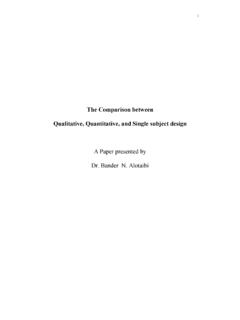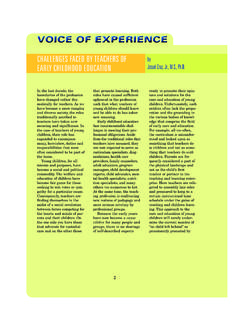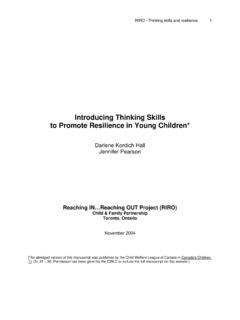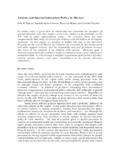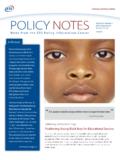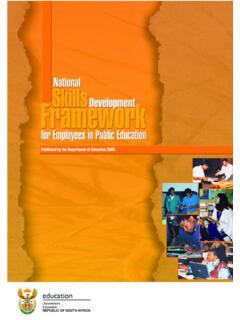Transcription of Advances in Research and Praxis in Special …
1 Advances in Research and Praxis in Special education in Africa, Caribbean, and the Middle EastA volume inResearch on education in Africa, the Caribbean, and the Middle EastKagendo Mutua and Cynthia Szymanski Sunal, Series EditorsAdvances in Research and Praxis in Special education in Africa, Caribbean, and the Middle Eastedited byKagendo MutuaUniversity of AlabamaCynthia Szymanski SunalUniversity of AlabamaINFORMATION AGE PUBLISHING, , NC 2012 Information Age Publishing rights reserved. No part of this publication may be reproduced, stored in aretrieval system, or transmitted, in any form or by any means, electronic, mechanical, photocopying, microfilming, recording or otherwise, without written permissionfrom the in the United States of AmericaLibrary of Congress Cataloging-in-Publication Data vContents Contributors.
2 Vii Introduction: The Limits of Policy and Praxis : Critical issues in Inclusive education in Selected Countries of Africa, Caribbean and the Middle East ..ixKagendo Mutua & Cynthia Szymanski SunalPart ISpecial education Research and Praxis in afRica 1 Early Intervention Programs in the Southern African Region ..3 John Charema 2 Special education in Nigeria: Shifting Paradigms ..23 Festus E. Obiakor, Michael Eskay, and Michael O. Af l yan 3 Challenges Facing Pupils and Staff at Botswana Community Junior Secondary: Schools The Student Teachers Perspective ..37 Gareth Dart 4 Rapid Changes and Challenges in a South African Paradigm ..55 Joan Jafthas 5 education for Students with Intellectual Disabilities in Kenya: Challenges and Prospects ..67 Gathogo Mukuriavi Contents 6 Contextualizing Inclusive education in Tanzania.
3 87 Filiz Polat 7 Defining the Disabled Person: An Analysis of the Continental Plan of Action for the African Decade of Persons with Disabilities ..107 Bethsaida NievesPart IISpecial education Research and Praxis in the caRibbean 8 Special education in the Caribbean: Teachers Attitudes Toward Inclusion in Barbados, Cayman Islands, Grenada, Jamaica, St. Lucia, and St. Vincent ..129 Junnie O. Lynch, Clara Wolman, and Judy Harris-LoobyPart IIIS pecial education Research and Praxis in the Middle eaSt 9 Children with ADHD in Turkey: Inclusion, Research , and Practice ..155 Selda Ozdemir 10 Special education Advances in the State of Qatar: Research and Implications ..173 Asma Al Attiyah and Brenda Belson Lazarus 11 Current Special education Programs in the Hashemite Kingdom of Jordan ..193 Mohammad AL Jabery, Jamal AL Khateeb, and Marshall Zumberg 12 The Saudi Early Intervention Services: Current Challenges and the Vision for Revision.
4 207 Haniah M. Merza Epilogue ..223 Mara Sapon-ShevinAdvances in Research and Praxis in Special education in Africa, Caribbean, and the Middle East, page viiCopyright 2012 by Information Age PublishingAll rights of reproduction in any form reserved. viiContributorsMichael O. Af l yanIllinois Board of Higher education , USAAsma Al AttiyahQatar University, Doha, QatarMohammad AL JaberyThe University of JordanJamal AL KhateebThe University of JordanJohn CharemaMophato education Centre, Francistown, BotswanaGareth DartInstitute of education , University of Worcester, UKMichael EskayUniversity of the Cumberlands, Kentucky, USAJudy Harris-LoobyBarry University, Florida, USAJoan JafthasWestern Cape education Department, Caledon, South AfricaBrenda Belson LazarusFlorida Gulf Coast University, USAJ unnie O. LynchMiami-Dade Public Schools, Florida, USAH aniah M.
5 MerzaKing Saud University, Riyadh, Saudi ArabiaGathogo MukuriaSlippery Rock University, Pennsylvania, USAK agendo MutuaThe University of Alabama, USAB ethsaida NievesUniversity of Wisconsin at Madison, USAF estus E. ObiakorUniversity of Wisconsin-Milwaukee, USAS elda OzdemirGazi University, Ankara, TurkeyFiliz PolatUniversity of Hong KongMara Sapon ShevinSyracuse University, New York, USAC ynthia Szymanski SunalThe University of Alabama, USAC lara WolmanBarry University, Florida, USAM arshall ZumbergWayne State University, Ohio, USAA dvances in Research and Praxis in Special education in Africa, Caribbean, and the Middle East, pages ix xviCopyright 2012 by Information Age PublishingAll rights of reproduction in any form reserved. ixIntroduCtIonthe Limits of PoLiCy and PraxisCritical issues in inclusive education in selected Countries of africa, Caribbean and the middle eastKagendo mutua & Cynthia szymanski sunal University of AlabamaPersons with disabilities anywhere in the world constitute a social minority group that is by and large disenfranchised and marginalized in education , access to employment, and in their access to other socially valued rewards.
6 Even in developed countries where various disability programs have existed for years, persons with disabilities still continue to have limited access to cultural capital. According to Katsillis and Rubinson (1990), cultural capi-tal is the vehicle through which background inequalities are translated into differential academic rewards and which in turn lead to unequal social and economic rewards, thereby maintaining and legitimizing the process (p. 270). In this vein, therefore, cultural capital plays a fundamental role in the reproduction of the educational, social, and economic hierarchies x the Limits of Policy and Praxisthat are evident in society. In no other area is lack of cultural capital as self-evident as in the area of disability. Because of their lack of access, in part due to their disabling conditions and in part due to attitudinal barriers stemming from the social perception of their disabilities, individuals with disabilities have limited access to ways of talking and acting, socializing, values, competencies, behavior and forms of knowledge (Bourdieu, 1986; McLaren, 1998) that place them in socially desirable positions.
7 Applying the theory of cultural capital in the understanding of the socio-cultural lo-cation of disability in society and of individuals labeled as disabled, one becomes more acutely aware of the role that arbitrary culturally ascribed distinctions that differ in power and prestige play in defining the social po-sitions of persons with disabilities and how disabled individuals are placed into particular lower social class edited volume explores various issues pertaining to the education of children with disabilities in Africa, the Caribbean, and the Middle East. As a group, persons with disabilities have been subjected to social, cultural, and educational exclusions of various forms and for various socially scripted reasons. In education , for instance, individuals with disabilities have been altogether excluded from educational participation in many parts of the developing world, or they have been excluded from pursuing meaningfully beneficial higher levels of education in developed countries like the United States.
8 One of the social responses/remedies to the widely acknowledged exclusionary practices experienced by learners with disabilities has been the widespread implementation of inclusive practices in the education of individuals with disabilities across countries, in the west and the developing regions of the world. A distinctive marker of difference in the way inclusive practices have been enacted in western countries versus those in the devel-oping world has primarily stemmed from the fact that majority of western countries operate under funded mandates that also regulate the provision of education to persons with disabilities. While the ideal of inclusion has been highly desirable, many countries in the developing world have floun-dered in their implementation due to a lack of a sound legislative frame-work to guide implementation coupled with socio-cultural factors related to negative perceptions of disabilities and limited funding sources.
9 Chapters in this volume explore inclusive education from various impact of childhood disability is explored from the vantage point of inclusive education in a number of selected African countries ranging from Kenya and Nigeria to Tanzania and Botswana. Related issues explored in the various chapters all tie to the overarching theme of inclusive education the Limits of Policy and Praxis xivis- -vis national and, quite often, international policy and its implementa-tion within countries. In many developing countries, particularly those of sub-Saharan Africa, disability issues have not taken firm root in large ex-tent due to a lack of funded policy mandates on disability. In addition to a general paucity of meaningful and enforced disability policies in many of those contexts, there is also a silence in social discourse surrounding dis-ability issues.
10 This absence of disability in social discourse is sustained to a large extent by the absence of political will around the subject of disability and a cultural history that did not associate disability with full-fledged citi-zenship first chapter in this section is John Charema s, which explores the role and implementation of early intervention programs for young chil-dren with or at risk for disabilities. Specifically, the chapter demonstrates the importance and centrality of parental participation through reinforce-ment of discreetly learned skills in natural contexts. In his chapter, Cha-rema argues that although the first wave of early intervention Research has proven unequivocally that intervening early makes a positive difference in the outcomes that children achieve in later years, he nonetheless warns of the pitfalls of uncritically adopting Western ideas without evaluating their potential negative effects on families and children in different cultures.
